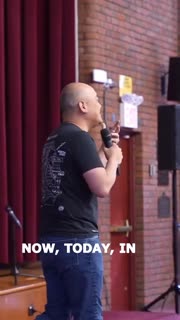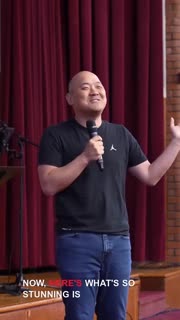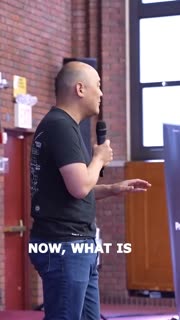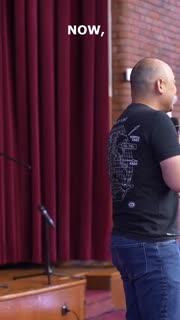Embracing Philozenia: The Call to Radical Hospitality
Summary
### Summary
In today's message, we explored the profound concept of hospitality, rooted in the Greek word "philozenia," which means "love for the stranger." This idea is central to the Christian faith and is a recurring theme in both the Old and New Testaments. Paul, in his letter to the Romans, exhorts believers to practice sincere love, hate what is evil, and cling to what is good. He emphasizes the importance of being devoted to one another, honoring others above ourselves, and maintaining spiritual fervor. Paul also calls for joy in hope, patience in affliction, and faithfulness in prayer, culminating in the practice of hospitality.
We delved into the historical context of hospitality in the early church, highlighting how Christians were known for their extraordinary care for the sick and the persecuted, even during plagues and epidemics. This radical love and hospitality were not just about hosting friends but extending love to strangers and even enemies. The early Christians' commitment to philozenia was a stark contrast to the prevalent xenophobia (fear of strangers) in society.
We also discussed the Latin roots of the word "hospitality," which shares a close relationship with "hostility," emphasizing the fine line between being hospitable and hostile. The call to practice hospitality is not just about being kind to those we like but extending love and blessings to those who may have wronged us or whom we find difficult to love.
Paul's exhortation to bless those who persecute us, using the word "eulogio" (to give a good word), challenges us to speak blessings even over our enemies. This practice of eulogizing the living can have a profound impact, as research shows that compliments and kind words significantly uplift others more than we often realize.
In conclusion, the call to philozenia is a call to embody the radical love of Jesus, who taught us to love our enemies and bless those who curse us. This love is not just a moral code but a reflection of the profound love we have received from God, who loved us even when we were far from Him. This divine love compels us to extend the same love and hospitality to others, making philozenia a defining mark of our Christian witness.
### Key Takeaways
1. Philozenia: Love for the Stranger
- The Greek word "philozenia" combines "philo" (love) and "xenos" (stranger), urging us to extend love beyond our familiar circles. This radical hospitality is a core Christian virtue that challenges us to love those we do not know or even those we might consider enemies. [02:27]
2. Historical Context of Christian Hospitality
- Early Christians were known for their extraordinary care for the sick and persecuted, even during plagues. Their commitment to philozenia was a stark contrast to the xenophobia prevalent in society. This radical love was a key factor in the growth of the early church. [06:23]
3. Hospitality vs. Hostility
- The Latin roots of "hospitality" and "hostility" highlight the fine line between welcoming strangers and being hostile towards them. Practicing hospitality means choosing to extend love and kindness, even when it is easier to be hostile. [11:06]
4. Blessing Our Enemies
- Paul’s exhortation to bless those who persecute us, using the word "eulogio" (to give a good word), challenges us to speak blessings over our enemies. This practice can transform our relationships and environments, making us agents of God's love. [14:11]
5. Reflecting Divine Love
- The call to philozenia is rooted in the profound love we have received from God. Jesus' teaching to love our enemies and bless those who curse us is not just a moral code but a reflection of the divine love that compels us to extend the same love and hospitality to others. [28:59]
### YouTube Chapters
1. [0:00] - Welcome
2. [01:04] - Introduction to Hospitality
3. [02:27] - Philozenia: Love for the Stranger
4. [03:49] - Historical Context of Christian Hospitality
5. [05:08] - Dionysius' Letter on Christian Behavior
6. [06:23] - Early Christians' Radical Love
7. [08:09] - Philozenia vs. Xenophobia
8. [09:47] - Personal Reflection on Hospitality
9. [11:06] - Hospitality vs. Hostility
10. [12:50] - Blessing Those Who Persecute
11. [14:11] - Eulogio: Giving a Good Word
12. [15:53] - The Power of Compliments
13. [17:13] - Practical Exercise: Sending Blessings
14. [20:50] - Sharing Words of Blessing
15. [23:39] - Praying for Our Enemies
16. [25:03] - Reflecting on the Difficulty of Blessing Enemies
17. [27:22] - Personal Story: Practicing Philozenia
18. [28:59] - Jesus' Teaching on Loving Enemies
19. [30:37] - Conclusion: Reflecting Divine Love
Study Guide
### Bible Reading
1. Romans 12:9-13 (NIV)
> "Love must be sincere. Hate what is evil; cling to what is good. Be devoted to one another in love. Honor one another above yourselves. Never be lacking in zeal, but keep your spiritual fervor, serving the Lord. Be joyful in hope, patient in affliction, faithful in prayer. Share with the Lord's people who are in need. Practice hospitality."
2. Matthew 5:44 (NIV)
> "But I tell you, love your enemies and pray for those who persecute you."
3. Genesis 18:1-8 (NIV)
> "The Lord appeared to Abraham near the great trees of Mamre while he was sitting at the entrance to his tent in the heat of the day. Abraham looked up and saw three men standing nearby. When he saw them, he hurried from the entrance of his tent to meet them and bowed low to the ground. He said, 'If I have found favor in your eyes, my lord, do not pass your servant by. Let a little water be brought, and then you may all wash your feet and rest under this tree. Let me get you something to eat, so you can be refreshed and then go on your way—now that you have come to your servant.' 'Very well,' they answered, 'do as you say.' So Abraham hurried into the tent to Sarah. 'Quick,' he said, 'get three seahs of the finest flour and knead it and bake some bread.' Then he ran to the herd and selected a choice, tender calf and gave it to a servant, who hurried to prepare it. He then brought some curds and milk and the calf that had been prepared, and set these before them. While they ate, he stood near them under a tree."
### Observation Questions
1. What does Paul instruct believers to do in Romans 12:9-13? How does he describe the nature of love and hospitality? [01:04]
2. How did Abraham demonstrate hospitality in Genesis 18:1-8? What actions did he take to welcome the strangers?
3. According to Matthew 5:44, what are Jesus' instructions regarding our enemies? How does this align with the concept of philozenia discussed in the sermon? [27:22]
4. What historical examples of Christian hospitality were mentioned in the sermon? How did early Christians practice philozenia during times of persecution and plagues? [06:23]
### Interpretation Questions
1. Why does Paul emphasize the importance of sincere love and hospitality in Romans 12:9-13? How does this reflect the broader Christian ethic? [01:04]
2. How does the story of Abraham in Genesis 18:1-8 serve as a model for Christian hospitality? What can we learn from his actions?
3. In what ways does Jesus' teaching in Matthew 5:44 challenge our natural inclinations towards those who have wronged us? How does this teaching relate to the concept of blessing our enemies as discussed in the sermon? [27:22]
4. How did the early Christians' practice of philozenia contribute to the growth of the church, despite being a persecuted minority? What does this tell us about the power of radical hospitality? [06:23]
### Application Questions
1. Reflect on your own life. How can you practice sincere love and hospitality in your daily interactions, especially towards those you may not know well or consider strangers? [01:04]
2. Think of a time when you were shown hospitality by someone unexpected. How did that experience impact you? How can you extend similar hospitality to others in your community?
3. Jesus instructs us to love our enemies and pray for those who persecute us. Identify someone in your life who you find difficult to love. What specific steps can you take this week to bless and pray for them? [27:22]
4. The early Christians were known for their care for the sick and persecuted. How can you and your small group embody this kind of radical love and hospitality in your local context? [06:23]
5. The sermon mentioned the fine line between hospitality and hostility. Are there areas in your life where you find it easier to be hostile rather than hospitable? How can you shift your mindset and actions towards philozenia? [11:06]
6. The practice of eulogio, or giving a good word, was highlighted in the sermon. Think of someone who has impacted your life positively. Take a moment to send them a message of appreciation and share how they have blessed you. [14:11]
7. Reflect on the divine love you have received from God. How does this love compel you to extend hospitality and blessings to others, even those who may have wronged you? [28:59]
Devotional
Day 1: Radical Love for Strangers
Description: The Greek word "philozenia" combines "philo" (love) and "xenos" (stranger), urging us to extend love beyond our familiar circles. This radical hospitality is a core Christian virtue that challenges us to love those we do not know or even those we might consider enemies. The early Christians exemplified this by caring for the sick and persecuted, even during plagues, contrasting sharply with the xenophobia prevalent in society. Their commitment to philozenia was a key factor in the growth of the early church. [02:27]
Hebrews 13:2 (ESV): "Do not neglect to show hospitality to strangers, for thereby some have entertained angels unawares."
Reflection: Think of a stranger or someone outside your usual circle. How can you extend love and hospitality to them today in a tangible way?
Day 2: Historical Impact of Christian Hospitality
Description: Early Christians were known for their extraordinary care for the sick and persecuted, even during plagues. Their commitment to philozenia was a stark contrast to the xenophobia prevalent in society. This radical love was a key factor in the growth of the early church. By extending love and care to strangers and enemies, they demonstrated the transformative power of Christ's love, which drew many to the faith. [06:23]
1 Peter 4:9-10 (ESV): "Show hospitality to one another without grumbling. As each has received a gift, use it to serve one another, as good stewards of God's varied grace."
Reflection: Reflect on a time when you witnessed or experienced radical hospitality. How did it impact you, and how can you replicate that in your community?
Day 3: Choosing Hospitality Over Hostility
Description: The Latin roots of "hospitality" and "hostility" highlight the fine line between welcoming strangers and being hostile towards them. Practicing hospitality means choosing to extend love and kindness, even when it is easier to be hostile. This choice reflects the heart of Christ, who calls us to love our enemies and bless those who curse us. By choosing hospitality, we become agents of God's love in a world often marked by division and hostility. [11:06]
Romans 12:20 (ESV): "To the contrary, 'if your enemy is hungry, feed him; if he is thirsty, give him something to drink; for by so doing you will heap burning coals on his head.'"
Reflection: Identify someone you find difficult to love. What is one practical way you can extend kindness and hospitality to them this week?
Day 4: Blessing Our Enemies
Description: Paul’s exhortation to bless those who persecute us, using the word "eulogio" (to give a good word), challenges us to speak blessings over our enemies. This practice can transform our relationships and environments, making us agents of God's love. Research shows that compliments and kind words significantly uplift others more than we often realize. By choosing to bless rather than curse, we reflect the radical love of Jesus and open the door for reconciliation and healing. [14:11]
Luke 6:27-28 (ESV): "But I say to you who hear, Love your enemies, do good to those who hate you, bless those who curse you, pray for those who abuse you."
Reflection: Think of someone who has wronged you. Can you take a moment to pray for them and ask God to bless them today?
Day 5: Reflecting Divine Love
Description: The call to philozenia is rooted in the profound love we have received from God. Jesus' teaching to love our enemies and bless those who curse us is not just a moral code but a reflection of the divine love that compels us to extend the same love and hospitality to others. This divine love is transformative and calls us to go beyond our comfort zones to embody the radical love of Jesus in our daily lives. [28:59]
1 John 4:19-21 (ESV): "We love because he first loved us. If anyone says, 'I love God,' and hates his brother, he is a liar; for he who does not love his brother whom he has seen cannot love God whom he has not seen. And this commandment we have from him: whoever loves God must also love his brother."
Reflection: Reflect on the love you have received from God. How can you let this divine love flow through you to others, especially those who are difficult to love?
Quotes
1. "Now, today, in today's world, most of us, when we think of this word hospitality, we think of, oh, it's basically a time and space for me to host people, to invite people over to my place, or to meet at a local shop or coffee shop or whatever, and to extend hospitality to the people that I love. But here, do you see, even embedded in this word is something so different. It's so extra, so unusual for even the world that we live in. It's a love that means a stranger." [02:27] (29 seconds)
2. "Now, here's what's so stunning is Dionysius actually writes a letter outlining what Christians were known for and how they behaved in the midst of bloody persecution. So you got to imagine, Christians were dying for their faith. Their families are dying for their faith. And not only that, an epidemic, a plague would come upon the Roman Empire in northern Africa, as well as regions of Rome and in the Roman Empire. And this plague, this epidemic would end up befalling so many people that people were dying and getting sick." [05:08] (30 seconds)
3. "Now, here's what Christians have observed about the early church. Because how did the early church grow? When they were just this small, easily snuffed out minority? They grew because of philoxenia, because of a love that would belie the ways, a love that extended to the sick and to the hurting and to the other. Now, that is stunning, because it wasn't like some slick marketing campaign, a beautiful website, great social media presence, like being kind of this it cool church that's serves granola bars every week. It was, there was none of that. It was the texture of philoxenia, the ways that somehow Christians embody a kind of love, a kind of ethic, that would be so different than the ways of the world." [08:09] (72 seconds)
4. "Now, isn't this stunning? That this is what the early Christian church was known for. And yet today, there's actually a word that's popular in today's culture. In fact, many would actually say that a lot of Christians exhibit this other word that you don't even have to know Greek, but you've probably heard this word before. This word is xenophobia. Anyone heard this word? Now, keep in mind, xenophobia actually comes from the same kind of, it's a compound word, xenos, which is stranger, and phobia, fear of, the fear of strangers." [08:09] (33 seconds)
5. "Now, here's what's interesting, right? Because xenophobia is such a fear of the other, and yet the Christian ethic was so profoundly different. In Latin, there's actually a couple of words where we get the word hospitality. Now, the word for stranger or guest is actually this word hospice. So in Latin, the word hospice, this is where we get words like hospital from or hospitality. Now, this word for hospitality for guest or stranger. Now, notice there's actually another word that's actually very similar to this word hospice. It's the word hostess. Just one letter different. And it's the word for enemy. We actually get words like hostility from hostess, because we are hostile to our enemies and to those who are different than us." [11:06] (50 seconds)
6. "Now, here's the thing, right? There's this fine line between being hospitable towards or being hostile towards. And the reality is it's easy and it's easier to actually waffle and wade into hostile territory rather than being hospitable. And yet the early church, and when Paul is talking about practicing hospitality, he's talking about philozenia, that this is what the church is. And when Paul is talking about practicing hospitality, not by xenophobia, not by hostility, but actually hospitality." [11:06] (40 seconds)
7. "Now, what is this word blessing? What does it mean to bless those who persecute you? Now again, on this spectrum, he's saying, hey, just don't bless those people that you want to bless, that somehow you derive some sort of benefit because you've blessed them. It's a way to make friends, or it's simply like, it helps me because these are the people I'm supposed to love, like my family. But he actually says, bless those who persecute you. How stunning is that kind of moral vision?" [12:50] (27 seconds)
8. "Now, let me ask you this question. You don't even need to know Greek, but this word eulogio, what word does that sound like or look like in English? Eulogy. Isn't that interesting? Now, in what context often are eulogies given? Anyone? Funerals. Thank you. Sorry, I realize some of you are like, Drew, you don't normally ask questions like this to us. So like, what are you doing? Cognitive dissonance, right? I get it. I get it. We're just trying to make things more interactive. Yeah, eulogy. We give them at funerals." [14:11] (39 seconds)
9. "Now, isn't that true? I know that growing up from a background where there weren't a lot of compliments or words of blessing being said to one another, like, there's something, though, about why is it so hard for me just to give words of blessing to people, to speak a good word over them? And yet, this is the invitation that we have. And so, here's what we're going to do. We're going to do this. We're going to do this. We're going to do this. I'm going to invite you to take out your phones." [18:39] (37 seconds)
10. "Now, the reality is that's supposed to be incredibly difficult because it's just not the way that we normally function. Like, why would I pray a blessing over someone when I hate them or they've hurt me in such a manner? And yet, this is what Philozenia looks like. This is what, when Paul, it's, it's writing under this greater tradition. And this is what's so stunning, right? Because it is extra. This moral vision is something that really does feel supernatural. Why would anyone do this, especially in a city like this, which is full of cursing one another?" [25:03] (33 seconds)










